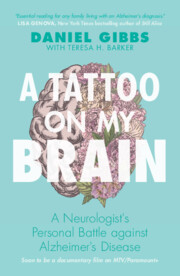Book contents
- A Tattoo on My Brain
- Reviews
- A Tattoo on My Brain
- Copyright page
- Dedication
- Contents
- Acknowledgments
- Introduction
- Prologue
- 1 Beacon Rock
- 2 Forewarned and Forearmed
- 3 The Smell of Baking Bread
- 4 Sneak Preview
- 5 A Stubborn Puzzle
- 6 The Locked Box and the Family Tree
- 7 The Measure of Memory
- 8 Orcas Nonetheless
- 9 My Brain, My Self
- 10 The Reveal
- 11 Cognitive Reserve and Resiliency: Brain Cells in the Bank
- 12 My Experimental Life
- 13 When ARIA Is More than an Operatic Solo
- 14 My Experiential Life: Living with Early-Stage Alzheimer’s Disease
- 15 Madeleines, Music and African Doves
- 16 It’s Only Scary If You Look Down
- 17 Beyond DNA: Family History Reconsidered
- 18 News at 5: Retired Neurologist Battles Alzheimer’s
- 19 The Forest, the Trees and the Ground Beneath My Feet
- 20 What’s in a Name? Alzheimer’s Reimagined
- 21 A Meaningful Outcome
- Epilogue: The Writing Life
- Epilogue: The Writing Life, Act II
- Appendix:
- Resources
- Index
- References
11 - Cognitive Reserve and Resiliency: Brain Cells in the Bank
Published online by Cambridge University Press: 12 November 2022
- A Tattoo on My Brain
- Reviews
- A Tattoo on My Brain
- Copyright page
- Dedication
- Contents
- Acknowledgments
- Introduction
- Prologue
- 1 Beacon Rock
- 2 Forewarned and Forearmed
- 3 The Smell of Baking Bread
- 4 Sneak Preview
- 5 A Stubborn Puzzle
- 6 The Locked Box and the Family Tree
- 7 The Measure of Memory
- 8 Orcas Nonetheless
- 9 My Brain, My Self
- 10 The Reveal
- 11 Cognitive Reserve and Resiliency: Brain Cells in the Bank
- 12 My Experimental Life
- 13 When ARIA Is More than an Operatic Solo
- 14 My Experiential Life: Living with Early-Stage Alzheimer’s Disease
- 15 Madeleines, Music and African Doves
- 16 It’s Only Scary If You Look Down
- 17 Beyond DNA: Family History Reconsidered
- 18 News at 5: Retired Neurologist Battles Alzheimer’s
- 19 The Forest, the Trees and the Ground Beneath My Feet
- 20 What’s in a Name? Alzheimer’s Reimagined
- 21 A Meaningful Outcome
- Epilogue: The Writing Life
- Epilogue: The Writing Life, Act II
- Appendix:
- Resources
- Index
- References
Summary
I spend much of my day reading science – updates on clinical studies, current journals, and deep dives into the growing scientific literature on the many facets of neurodegenerative disease, dementia, Alzheimer’s disease and, specifically, early-stage Alzheimer’s. I also read spy novels and work crosswords throughout the day as if my life depended on it. In a way, it does.
The Holy Grail of Alzheimer’s research is the search for a treatment that can halt the underlying disease process. A drug, a procedure, some sophisticated treatment regimen that, in medicine, we call a disease-modifying intervention. While nothing has proved reliably effective in clinical trials so far, a lot has been learned about what goes on in the brain during the disease process. The role of cognitive reserve and resiliency is something of a wild card – it’s not fully understood – but it is emerging as a promising factor in the brain’s capacity to forestall the effects of Alzheimer’s for a longer period without significant symptoms.
- Type
- Chapter
- Information
- A Tattoo on my BrainA Neurologist's Personal Battle against Alzheimer's Disease, pp. 75 - 82Publisher: Cambridge University PressPrint publication year: 2023

